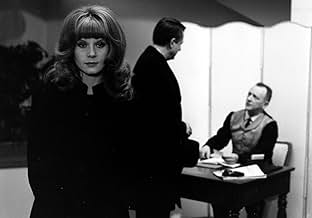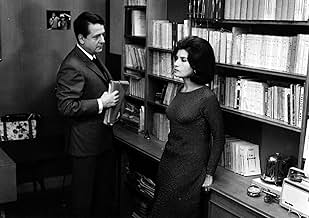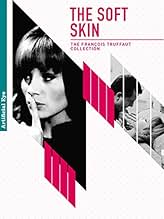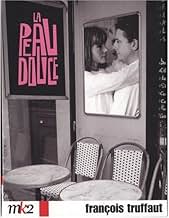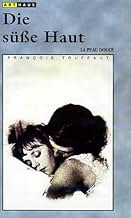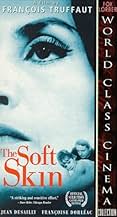IMDb-BEWERTUNG
7,5/10
8808
IHRE BEWERTUNG
Pierre Lachenay ist ein bekannter Verleger und Dozent, verheiratet mit Franca und Vater von Sabine, um die 10 Jahre alt. Dann lernt er die Stewardess Nicole kennen.Pierre Lachenay ist ein bekannter Verleger und Dozent, verheiratet mit Franca und Vater von Sabine, um die 10 Jahre alt. Dann lernt er die Stewardess Nicole kennen.Pierre Lachenay ist ein bekannter Verleger und Dozent, verheiratet mit Franca und Vater von Sabine, um die 10 Jahre alt. Dann lernt er die Stewardess Nicole kennen.
- Regie
- Drehbuch
- Hauptbesetzung
- Auszeichnungen
- 1 Gewinn & 2 Nominierungen insgesamt
Françoise Dorléac
- Nicole
- (as Françoise Dorleac)
Carnero
- Lisbon organizer
- (Nicht genannt)
Georges de Givray
- Le père de Nicole
- (Nicht genannt)
Catherine-Isabelle Duport
- Jeune fille Reims
- (Nicht genannt)
Maximiliènne Harlaut
- Mme. Leloix
- (Nicht genannt)
Charles Lavialle
- Veilleur hôtel Michelet
- (Nicht genannt)
Empfohlene Bewertungen
This Truffaut is more old cinema than new wave:Jean Desailly is unusual in ""Jules et Jim" director's universe.He's certainly one of the greatest French actors I know but he's better with Jean Delannoy or Edouard Molinaro.Truffaut's touch is here anyway:you can feel it thru the father/daughter relationship,during the scene when Desailly brings a classical music record to his little girl .The breakfast trail which the cat finds on this way will be here again in "la nuit américaine " (day for night).A lot of details show the cine buff Truffaut was,notably the restaurant called "la Colinière" the name of the mansion in Jean Renoir's "la règle du jeu";the room 813 is probably a nod to Maurice Leblanc and Arsène Lupin.
The love triangle would have been be trite,had not Truffaut focused on the cheated wife (Nelly Benedetti) ,an offbeat move.The end of the movie is hers ,at the expense of the late Françoise Dorleac's pretty girl character.And the scene in the street with the man who treats her like a whore is woman's lib before its time:"who do you think you are?take a good look at yourself! " this desperate woman screams.And the harsh conclusion heralds that of "la mariée était en noir" (the bride wore black).�
The love triangle would have been be trite,had not Truffaut focused on the cheated wife (Nelly Benedetti) ,an offbeat move.The end of the movie is hers ,at the expense of the late Françoise Dorleac's pretty girl character.And the scene in the street with the man who treats her like a whore is woman's lib before its time:"who do you think you are?take a good look at yourself! " this desperate woman screams.And the harsh conclusion heralds that of "la mariée était en noir" (the bride wore black).�
François Truffaut's fourth feature and his first true masterpiece is essentially a classic love triangle, filmed like a quiet juggernaut that eventually overwhelms all those involved. On a quick trip to Lisbon for a lecture, literary essayist Jean Desailly's eye catches the lovely Françoise Dorléac, the air hostess on his flight. Soon he's asking her out for a drink and a love affair develops in between her flights, as his married life with seductive but demanding wife Nelly Benedetti slowly unravels. Much to Truffaut's credit, there is no judgment passed on any of the characters: whether Desailly is undergoing a dreaded mid-life crisis and wishes to be young again or is merely indulging an intellectual whim, whether he really wants to prove himself he is still a man capable of passion or just looking for a way out of his stifling marriage, is entirely up to the viewer to decide. But the director doesn't avert his eye from the seedy unpleasantness of the central situation, as the masterfully extended Reims interlude and the shock ending prove. Basically, it's a film about the mess people make when they think they're in love, all the more disturbing because Truffaut bases it all on chance meetings and missed opportunities - had Desailly not arrived late for his plane to Lisbon, had Dorléac not called him back at the hotel, maybe none of this would have happened. Marvelously shot in black and white by Nouvelle Vague lenser Raoul Coutard, this was the very first film where Truffaut showed the world all he was capable of; it's a stunningly modern film on the most classic of all melodramatic stories.
Truffaut filmed La Peau Douce immediately after the international success of "Jules et Jim". Released at the heyday of the nouvelle vague, critics and audiences panned the film as a futile resort to bourgeois classicism after the unconventional antics of his previous masterwork.
They could not have been more mistaken. Time has treated La Peau Douce better than most of his later efforts. It is definitely a triumph of direction with each scene being carefully planned and meticulously structured, not unlike a Hitchcock movie. In practice, Truffaut transposes Hitchcock's mechanisms of suspense into a seemingly trivial story concerning the illicit love affair of a distinguished editor/author with a younger stewardess and its withering consequences. The characters and the milieu of the story are effortless evoked, but the main joy is derived from the visual inventiveness that Truffaut shows in scene after scene. It's a triumph of a purely cinematic mode of expression, which Truffaut was one of the few who had really mastered it.
They could not have been more mistaken. Time has treated La Peau Douce better than most of his later efforts. It is definitely a triumph of direction with each scene being carefully planned and meticulously structured, not unlike a Hitchcock movie. In practice, Truffaut transposes Hitchcock's mechanisms of suspense into a seemingly trivial story concerning the illicit love affair of a distinguished editor/author with a younger stewardess and its withering consequences. The characters and the milieu of the story are effortless evoked, but the main joy is derived from the visual inventiveness that Truffaut shows in scene after scene. It's a triumph of a purely cinematic mode of expression, which Truffaut was one of the few who had really mastered it.
On a business trip to Lisbon you're distracted, by a stewardess you find rather attractive, so you take a chance and call, as she's staying down the hall, it's a tangent that will mean, your life's refracted. You're consumed with all the flushes of desire, she's igniting all the flames your wife cant fire, but opportunities to meet, while remaining quite discreet, when back in Paris, leaves you shackled in the mire. A business trip to Reims provides a chance, to take Nicole, and to enjoy some more romance, get some privacy at last, break your circumstantial fast, though best laid plans may leave you looking more askance.
A well-known publisher has an affair that delivers considerably more than he bargained for. Great performances and original for its time.
A well-known publisher has an affair that delivers considerably more than he bargained for. Great performances and original for its time.
10andrabem
Pierre Lachenay (Jean Desailly) is a successful writer. He is leaving Paris for Lisbon to give a conference on "Balzac et l'argent". On the flight to Lisbon he feels instant attraction for a beautiful flight stewardess. In Lisbon he'll discover that he's staying at the same hotel as her. Pierre wastes no time and gets to know her. Her name is Nicole (Françoise Dorléac). She is spontaneous and easy-going, but it's easy to detect the romantic streak in her. They start an affair right there in Lisbon. She gives him her Paris telephone number. He calls her. They meet. In Paris their relationship grows in intensity.
Pierre is a married man. His wife is also a good-looking woman and he has a 10-year-old daughter that loves him (as does his wife). Pierre is an intellectual with an organized life, maybe having had some flings here and there, but nothing that really threatened the comfortable foundations of his life. But now he has met Nicole. And Nicole represents everything that Pierre had never really experienced before: she has a real "joie de vivre" but underneath it, there is pain, and above all, strength - the strength to overcome sadness and start all over again, that is, to live right here and now.
Pierre, on the other hand, as an intellectual, lives a life of compromises. His wife, Franca (Nelly Benedetti), loves him and has a strong personality. She knows exactly what she wants and is determined to fight for it. Pierre is between two strong women. He loves Nicole - she has opened a new life, a new world for him. Will he follow his heart? And where will his heart lead him? I think that "La Peau Douce" is one of the more personal films made by Truffaut. It has a psychological subtlety not displayed in his later works (be it his later Antoine Doinel films, his literary adaptations, or his homages - to Hitchcock, Jean Renoir etc..). Never again would Truffaut reach the depth of "La Peau Douce".
"La Peau Douce" reveals understanding (and tenderness) for all the characters, but alongside these traits there's also a bitter irony and even some touches of dark comedy. The characters are shown in all their weaknesses and beauty. In later Truffaut films the tenderness would be the prevailing feature - the irony would come along in a watered-down form.
Pierre is a married man. His wife is also a good-looking woman and he has a 10-year-old daughter that loves him (as does his wife). Pierre is an intellectual with an organized life, maybe having had some flings here and there, but nothing that really threatened the comfortable foundations of his life. But now he has met Nicole. And Nicole represents everything that Pierre had never really experienced before: she has a real "joie de vivre" but underneath it, there is pain, and above all, strength - the strength to overcome sadness and start all over again, that is, to live right here and now.
Pierre, on the other hand, as an intellectual, lives a life of compromises. His wife, Franca (Nelly Benedetti), loves him and has a strong personality. She knows exactly what she wants and is determined to fight for it. Pierre is between two strong women. He loves Nicole - she has opened a new life, a new world for him. Will he follow his heart? And where will his heart lead him? I think that "La Peau Douce" is one of the more personal films made by Truffaut. It has a psychological subtlety not displayed in his later works (be it his later Antoine Doinel films, his literary adaptations, or his homages - to Hitchcock, Jean Renoir etc..). Never again would Truffaut reach the depth of "La Peau Douce".
"La Peau Douce" reveals understanding (and tenderness) for all the characters, but alongside these traits there's also a bitter irony and even some touches of dark comedy. The characters are shown in all their weaknesses and beauty. In later Truffaut films the tenderness would be the prevailing feature - the irony would come along in a watered-down form.
Wusstest du schon
- WissenswertesThe scenes set in Pierre Lachenay's apartment were filmed in Truffaut's own home.
- PatzerPierre and Nicole are in a hotel elevator approaching the 8th floor, Pierre is on the right side. The following shot from outside the elevator shows Pierre on the opposite side.
- Zitate
Pierre Lachenay: I've learned that men's unhappiness arises from the inability to stay quietly in their own room.
- VerbindungenFeatured in François Truffaut: Portraits volés (1993)
- SoundtracksPierre Et Nicole
Written and Performed by Georges Delerue Et Son Orchestre
Top-Auswahl
Melde dich zum Bewerten an und greife auf die Watchlist für personalisierte Empfehlungen zu.
- How long is The Soft Skin?Powered by Alexa
Details
- Erscheinungsdatum
- Herkunftsland
- Sprachen
- Auch bekannt als
- The Soft Skin
- Drehorte
- Produktionsfirmen
- Weitere beteiligte Unternehmen bei IMDbPro anzeigen
Box Office
- Bruttoertrag in den USA und Kanada
- 509 $
- Eröffnungswochenende in den USA und in Kanada
- 11.206 $
- 25. Apr. 1999
- Weltweiter Bruttoertrag
- 35.847 $
- Laufzeit1 Stunde 53 Minuten
- Farbe
- Sound-Mix
- Seitenverhältnis
- 1.66 : 1
Zu dieser Seite beitragen
Bearbeitung vorschlagen oder fehlenden Inhalt hinzufügen


![Bande-annonce [OV] ansehen](https://m.media-amazon.com/images/M/MV5BYzY4NmVmYjItNzQ2MS00MDU4LThlODctYjliMTRhM2ZmY2MwXkEyXkFqcGdeQXRyYW5zY29kZS13b3JrZmxvdw@@._V1_QL75_UX500_CR0)
